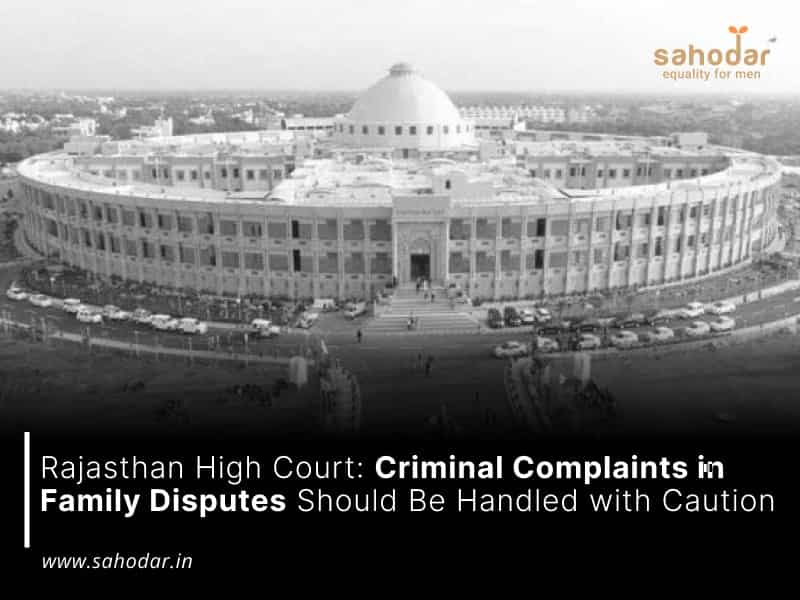Emphasis ought to be to encourage the enduring benefits of familial unity and cordiality, the Court said.
The Rajasthan High Court recently emphasized the need for careful consideration and due scrutiny before entertaining criminal complaints in family disputes [Gordhan Lal and 2 Others vs State of Rajasthan].
Justice Arun Monga highlighted that when a criminal complaint involves allegations of misconduct by one relative against another, both the magistrate and the police must exercise caution before proceeding to register a First Information Report (FIR).
“In such sensitive matters, it is imperative to act with circumspection, prioritizing efforts to mend familial relationships rather than exacerbating discord,” the Court underscored.
The Court emphasized that magistrates should personally verify the allegations through verbal inquiries or other appropriate methods, ensuring the complainant comprehends and substantiates their claims, thereby discouraging false or frivolous accusations.
“In disputes involving allegations of a non-violent nature and magisterial trials, particularly when close/blood relatives are involved, magistrates should be mindful that the customary requirement of a sworn affidavit is often treated as a mere formality, relying on generic templates,” the Court added.
The Bench made these remarks while considering a plea to quash an FIR filed based on a complaint by a 72-year-old woman against her daughter, son-in-law, and granddaughter.
The FIR had been registered following an order by the Chief Judicial Magistrate, Bikaner. In her complaint, the elderly woman accused her family members of misappropriating her property, including money, gold, and silver.
Upon reviewing the FIR, the Court noted that the alleged offences were not substantiated, yet the magistrate had ordered the registration of the FIR.
“Qua the order of the CJM, directing the registration of FIR, no doubt, his approach reveals adherence to the procedure as envisaged under section 175, ibid. However, the order doesn’t elaborate on any analysis or discussion of the material presented before him. Neither does his order record any satisfaction as to how the examination of the police report withstands the judicial rigor,” it added.
Describing it as a rubber-stamp decision, the Court stated that treating a family dispute as a criminal matter reflects a significant judicial oversight.
“Section 175(3) BNSS has been invoked with no reasoning given for its application. The decision for registration of FIR is heavily reliant on the police’s initial findings. A proactive approach by asking for supporting documentation would have ensured procedural fairness/any miscarriage of justice and judicial independence rather than point blank acceptance of police version,” it observed.
Regarding the allegations, the Court stated that the refusal to repay money or return gold and silver ornaments allegedly lent by the 72-year-old to her family members does not amount to a criminal offence.
“On the other hand, the allegations only show that the dispute between the complainant and the petitioners is purely civil in nature, which has been given the colour of criminality in the complaint forming the basis of the FIR,” it added, while quashing the FIR.
The Court stressed that criminal courts should not be used as instruments for personal vendettas or to secure undue advantages.
“To sum up, in family disputes triable by Magistrates, especially those involving close relatives, magistrates should strive to nurture an environment conducive to preserving and strengthening familial bonds,” the Single Judge said.
The Court further stated that amicably resolving disputes benefits not only the parties directly involved but also protects future generations from the harmful effects of prolonged animosities.

